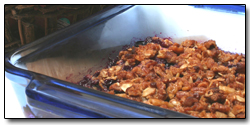It is always a pleasant treat for your taste buds and your body when you can create something that is positively decadent, yet nutritious. In this week’s recipe two powerhouse fruits—peaches and blueberries—combine to make such a dish.
The peaches, which are stone fruits, provide a wonderful golden color with a dash of crimson. Believed to be native to China, they deliver a slightly acid tang coupled with a natural sweetness. A good source of fiber, vitamins A and C, and potassium, they can be an important part of a diet designed to reduce cancer risk.
When selecting peaches, don’t just look for the telltale blush on the sides, but also pay attention to the area close to the stems. A greenish color may indicate that they were picked before their proper ripeness, while a creamy yellow color holds the promise of a fruit that will deliver the characteristic ripe flavor of peaches. If fresh peaches are not readily available, frozen peaches can be substituted.
Blueberries add a slight tartness. These mighty little berries are a good source of vitamins C and K, along with high amounts of anti-oxidants, prompting some people to call them “superfruit.” Once picked, they can be stored in the refrigerator for up to 10 days. They can also be frozen for future use.
The whole-wheat flour and rolled oats and walnuts add nutritional goodness as well as a crunchy consistency. Walnuts contain high amounts of polyunsaturated fat with both omega-3 and omega-6 fats, as compared to other nuts that contain primarily monounsaturated fatty acids. Unlike other ingredients, the good news is that the loss of nutritional value is minimal when walnuts are roasted.
The most common types of walnuts are grown in California, called English walnuts, native to the Middle East. Black walnuts are native to America. Either variety works well for the recipe. Nutritionally, black walnuts contain 10 percent less total fat and 20 percent less omega-3 fatty acids than English walnuts.
With or without the frozen yogurt, this recipe is sure to become one of your favorites.
Decadent Peach Crumble Studded with Blueberries
– Makes 4 servings.
Filling:
- nonstick cooking spray
- 1 pound fresh peaches, peeled, pitted and sliced, (about 2 1/2 cups)
- 1/2 cup blueberries
- 1 Tbsp. pure cane sugar
- 1/2 Tbsp. lemon juice
Topping:
- 1/3 cup whole-wheat flour
- 1/4 cup old-fashioned rolled oats (not instant)
- 1/4 cup packed light brown sugar
- 1/2 tsp. ground cinnamon
- Pinch of salt
- 1 Tbsp. butter, cut into small pieces at room temperature
- 1 1/2 Tbsp. frozen orange juice concentrate
- 1 Tbsp. chopped walnuts
- Nonfat vanilla frozen yogurt (optional)
Preheat oven to 375. Coat an 8-by-8-inch baking dish with cooking spray.
To make the filling: in large bowl lightly toss peaches, blueberries, sugar and lemon juice. Place filling in prepared baking dish. Cover with foil and bake for 15-20 minutes.
Meanwhile, make topping. In medium bowl, use fork to mix flour, oats, brown sugar, cinnamon, and salt. Add butter and blend with fingertips. Add orange juice concentrate and blend with fingertips until dry ingredients are moistened.
Remove filling from oven and stir it a little. Sprinkle topping evenly over the surface. Top with walnuts. Bake, uncovered, until topping is lightly golden brown, about 20-25 minutes more.
Let cool for at least 10 minutes before serving. Serve warm or at room temperature with nonfat frozen yogurt if desired. This recipe can be easily doubled.
Per serving: 220 calories, 5 g total fat (2 g saturated fat), 43 g carbohydrate, 4 g protein, 4 g dietary fiber, 80 mg sodium
The Author:
The American Institute for Cancer Research (AICR) is the cancer charity that fosters research on the relationship of nutrition, physical activity and weight management to cancer risk, interprets the scientific literature and educates the public about the results. It has contributed more than $87 million for innovative research conducted at universities, hospitals and research centers across the country. AICR has published two landmark reports that interpret the accumulated research in the field, and is committed to a process of continuous review. AICR also provides a wide range of educational programs to help millions of Americans learn to make dietary changes for lower cancer risk. Its award-winning New American Plate program is presented in brochures, seminars and on its website, www.aicr.org. AICR is a member of the World Cancer Research Fund International.
